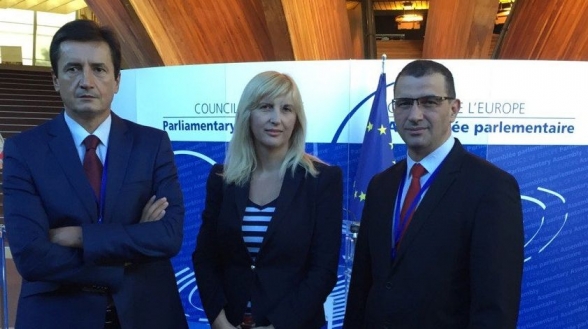When addressing the Parliamentary Assembly within the debate on the the topic “A comprehensive humanitarian and political response to the migration and refugee crisis in Europe”, President of the Chamber of Deputies of Italy Ms Laura Boldrini especially emphasised that Europe could respond to challenges of this crisis only by acting united. The migrant crisis is “the European problem that no country could solve on its own”, said Ms Boldrini, pointing out that the European Union was taking steps to establish a real common asylum policy.
Upon termination of the joint debate on the European asylum system and the meeting of new migration and asylum challenges by the countries of transit, the PACE adopted the Resolution 2072 (2015) recognising the need for reform of the Dublin system, including amendments to regulations upon which this system is based. The Resolution 2073 (2015), which was also adopted for this reason, states that the migration policy should be viewed from the global perspective, or that all the countries from which, through which and towards which the migrants are travelling should cooperate and coordinate their activities with the support of international actors such as the Office of the United Nations High Commissioner for Refugees (UNHCR), the International Organisation for Migration (IOM) and the European Union.
The agenda of today’s session also included a debate on the topic “Public health and the interests of the pharmaceutical industry”. The PACE also adopted the Resolution 2071 (2015) defining a series of measures aimed at stimulating the pharmaceutical industry to respond to the needs of public health more effectively, calling for stricter drug approval policies, full transparency with regard to real costs of their development, and, as needed, mandatory licences. The PACE has also called for undertaking measures aimed at reducing the conflict of interest in the health sector.
Today, the Parliamentary Assembly was also addressed by His Royal Highness the Grand Duke of Luxembourg who, bearing in mind the scope of the refugee and migrant crisis, called for governments of member states to find joint solutions and work long-term on resolving the key causes of the problem.
Within elections and appointments, the PACE elected a judge from the Slovak Republic to the European Court of Human Rights, while the incumbent Secretary General Mr Wojciech Sawicki was reelected to the position of the PACE Secretary General, for the period of five years.
During the day, meetings of the following were held: the Committee on Legal Affairs and Human Rights, the Committee on Social Affairs, Health and Sustainable Development; the Committee on Migration, Refugees and Displaced Persons; the Committee on Political Affairs and Democracy; the Committee on Culture, Science, Education and Media, and the Committee on Equality and Non-Discrimination.
On day three of the session, the parliamentarians will discuss the following: The activities of the Organisation for Economic Co-operation and Development (OECD) in 2014-2015; implementation of judgements of the European Court of Human Rights; and freedom of religion and living together in a democratic society.
Delegation of the Parliament of Montenegro participates in the Autumn Session in the following composition: Head of Delegation Mr Predrag Sekulić, and members of Delegation: Mr Goran Tuponja, and Ms Snežana Jonica.








